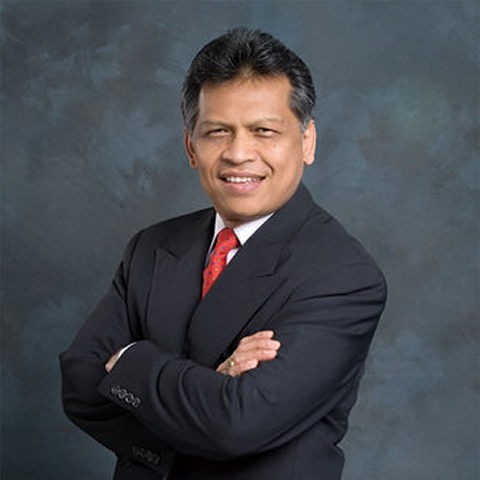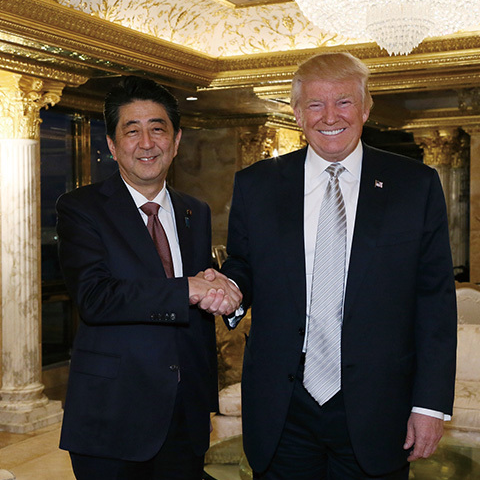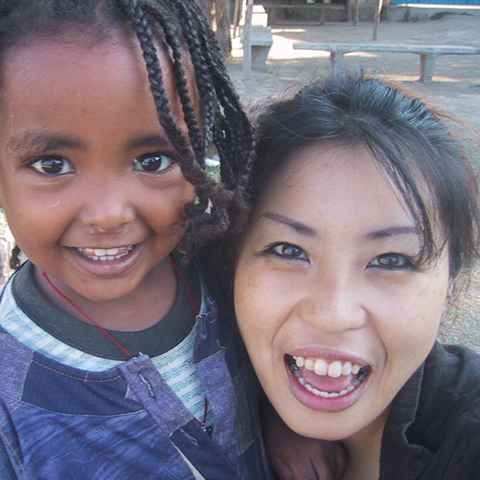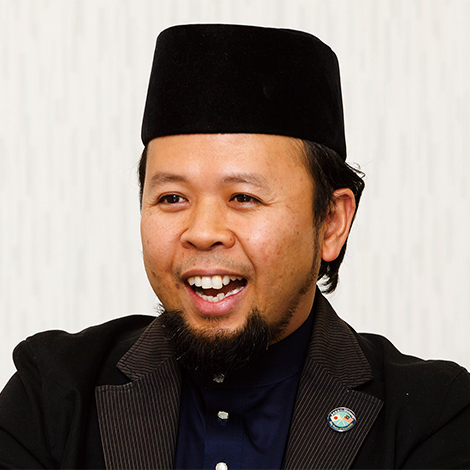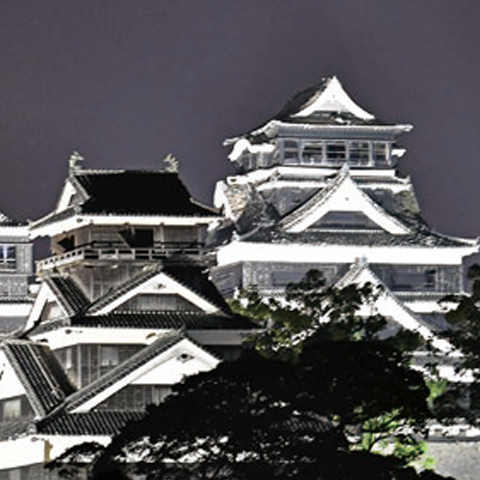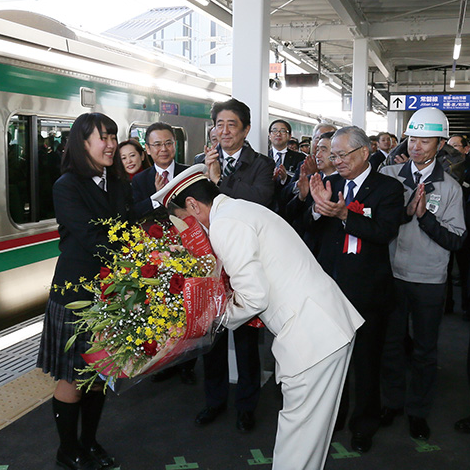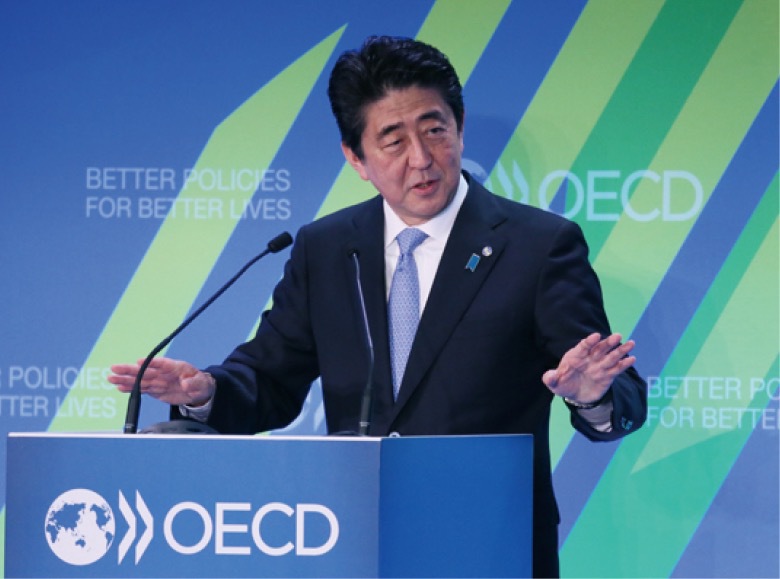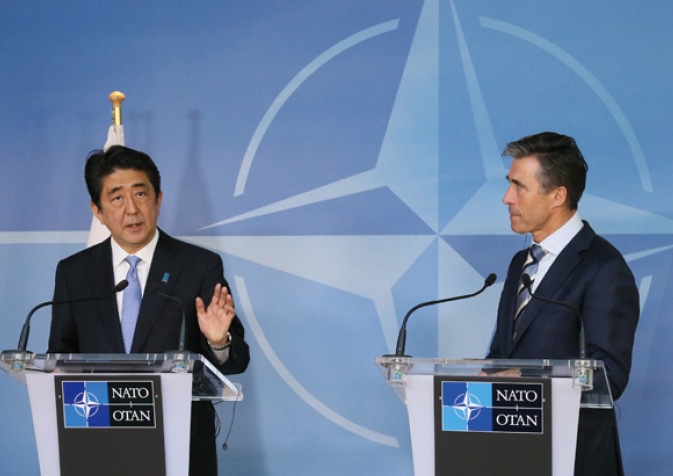OECD Ministerial Council Meeting: Keynote Speech by Prime Minister Abe
Prime Minister Shinzo Abe delivered a keynote speech at OECD Ministerial Council Meeting on May 6, 2014.
(Excerpt)
“The time for change is now.” Japan is determined to carry out reform without fail. Moreover, reform is already underway.
The Japanese economy has been reborn through my “three arrows.” Compared to seven years ago, the economic landscape has changed completely. Since Abenomics began, the ratio of job offers to job seekers has risen for 16 consecutive months. … This spring, a large number of companies took the decision to raise wages. Monthly wages will rise by more than 2 per cent.
I believe it would be fair to say that Japan is now truly on the verge of pulling out of deflation.
The Japanese economy is back. The vigorous economy that was once brimming with vitality as the “engine of world growth” has returned once again. The Japanese people are reaping the benefits of economic revival. The conditions are all set. Now, it’s time for bold reforms.
We are going to achieve the three goals of revitalizing the economy, rebuilding government finances, and reforming social security, and we will achieve these concurrently.
I will reform Japan’s electricity market into a completely competitive market. … We are also undertaking reforms in medical services. … We will press forward with further reforms to our corporate tax. … I will never be afraid of reform.
… I’m sure that Abenomics will come to completion only through tenacious devotion to reform.
The topmost agenda item on my list of reforms is to accelerate negotiations on EPAs with our economic partners around the world (ASEAN-Japan, Australia-Japan, TPP and EU-Japan). … A major economic sphere is now emerging in Asia and the Pacific. The gateway to this is Japan. Japan welcomes your investments.
Together with countries that share our fundamental values, I will create a major economic sphere that ensures competition under fair and impartial rules. … Fair and impartial rules for competition will spread around the world. That is the goal of my EPA strategy.
The priority at present should not be how to refine the rules being implemented within the OECD member countries so much as how to have emerging economies and other non-member countries share fair and impartial rules for competition.
We should discuss how the next 50 years will become. … Forecasts are not necessarily rosy. The pace of growth for the world as a whole is decelerating significantly. … However, with every crisis there comes an opportunity. I consider such times as these to be tremendous opportunities to refashion our thinking and push forward with structural reforms.
The key word here is “variety”—in other words, “diversity.” … We must go beyond the male viewpoint and fuse perspectives unique to women and foreign culture and the experiences of those who have failed. We should create … economic structure that draws forth the potential of all individuals to the greatest possible extent. That will surely lead us to the sustained growth in the 21st century.
The future will surely be bright, so long as young people do not lose hope. I firmly believe that. This is not limited only to Japanese young people. It is equally true for the girls I met in Abidjan learning at their sewing machines as well as the children I met in Phnom Penh whose lives were saved at the maternal and child health center. … Surely, we can change the world.
Japan and NATO as “Natural Partners”: Speech by Prime Minister Abe
Prime Minister Shinzo Abe also delivered a speech at the North Atlantic Council on the same day. In addition to the excerpt below, he mentioned that Japan and NATO would advance cooperation in a wide-range of areas in line with the newly-signed Individual Partnership and Cooperation Programme (IPCP), and announced that both had just decided to conduct concrete collaboration especially maritime security and women.
(Excerpt)
Over the almost 70 years since the end of World War II, Japan has followed the path of a peace-loving nation and consistently made efforts to realize the fundamental values such as freedom, democracy, human rights, and the rule of law embodied in the United Nations Charter. Japan will continue to adhere steadfastly to this course into the years to come.
At the same time, Japan has made steady contributions to world peace and stability across various individual fields, from international peace cooperation, disarmament, non-proliferation, international counter-terrorism, and the advancement of “human security” to disaster management cooperation.
On the foundation of this kind of unwavering path we have followed as a peace-loving nation, Japan will commit even more strongly than ever before to fostering global peace and prosperity.
Moreover, I believe that Japan should play a more proactive role in order fully to defend freedom of overflight, freedom of navigation, and other global commons.
This is the “Proactive Contribution to Peace” that I have been advocating.
A Japan that takes a panoramic perspective of the world map. A Japan that puts the policy of “Proactive Contribution to Peace” into practice to contribute to world peace and prosperity. For this kind of Japan, NATO, which shares our fundamental values, is indeed our “natural partner.”
It is fair to say that the current situation in Ukraine is the greatest challenge for post-Cold War Europe. We cannot accept “changes to the status quo by force or coercion. This is a global issue that also impacts Asia. Japan strongly urges all parties concerned to respect the rule of law and territorial integrity and to behave responsibly with maximum self-restraint.
In the East and South China Sea, there have been frequent attempts to unilaterally change the status quo by force or coercion. … For Japan, realizing peace and prosperity in the Asia-Pacific is a top priority. We will act in cooperation with any nation who seeks to play a constructive role towards that end.
At the same time, Japan will adhere to the rule of law and defend the maritime order, including freedom of navigation, as well as freedom of overflight. This is because Japan views that to be the sole path forward for ensuring the peace and prosperity of the Asia-Pacific.
This is an era in which it is no longer possible for any one nation to secure its own peace and security by itself.
We will ensure peace in the region and the world through cooperation with the international community. In order to carry this out, Japan has both the intention and the ability to play a more proactive role than ever before.
In addition, we are currently advancing discussions regarding the relationship between the Constitution of Japan and such issues as the right of collective self-defense, collective security measures, and peacekeeping operations. … The Government intends to set its policy orientation regarding what Japan should and can do to contribute to world peace and stability and what kind of domestic legal structure is needed.
I am extremely pleased that … just a little while ago we signed the Individual Partnership and Cooperation Programme, or “IPCP,” which will serve as the main guiding principles for future Japan-NATO cooperation.
We are more than simply “natural partners” that share fundamental values; we are also “reliable partners” corroborated by concrete actions.


























